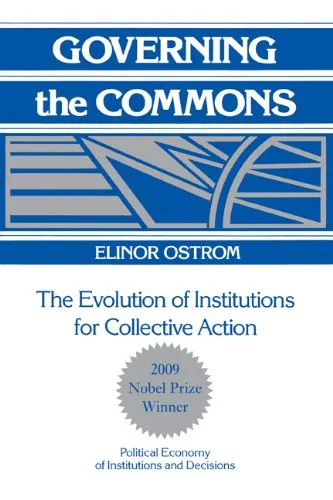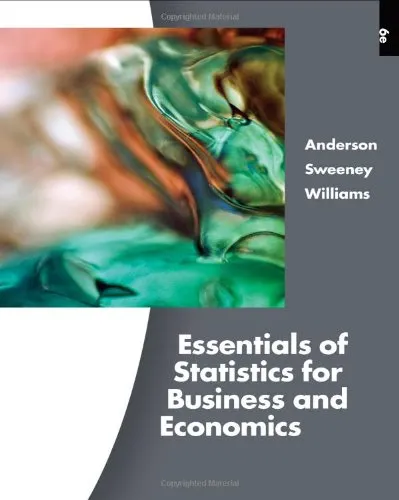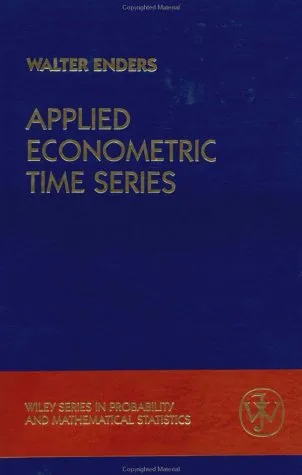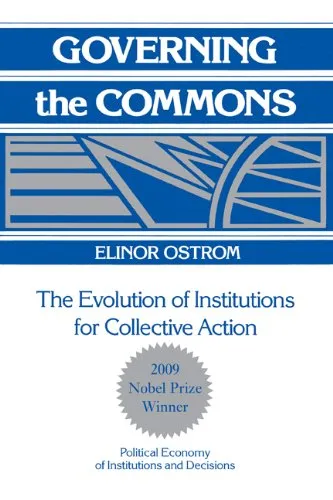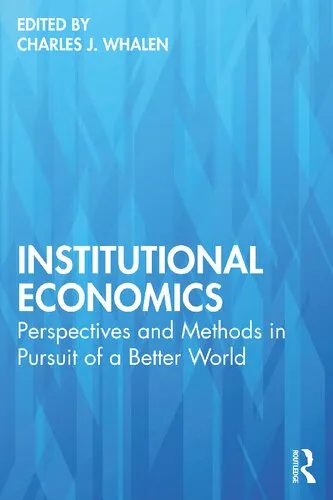Governing the Commons: The Evolution of Institutions for Collective Action (Political Economy of Institutions and Decisions)
5.0
بر اساس نظر کاربران

شما میتونید سوالاتتون در باره کتاب رو از هوش مصنوعیش بعد از ورود بپرسید
هر دانلود یا پرسش از هوش مصنوعی 2 امتیاز لازم دارد، برای بدست آوردن امتیاز رایگان، به صفحه ی راهنمای امتیازات سر بزنید و یک سری کار ارزشمند انجام بدینکتاب های مرتبط:
معرفی کتاب "Governing the Commons: The Evolution of Institutions for Collective Action"
کتاب Governing the Commons نوشته الینور اوستروم یکی از آثار برجسته در حوزه اقتصاد سیاسی و مدیریت منابع مشترک است. این کتاب با استفاده از بررسیهای تجربی و تحلیلهای نظری تلاش میکند تا نگاهی نوآورانه به مسئله مدیریت منابع طبیعی ارائه دهد. اوستروم با چالشکشیدن نظریات رایج درباره تراژدی منابع مشترک (Tragedy of the Commons)، پیشنهاد میدهد که جوامع محلی میتوانند با ایجاد نهادهای پایدار و منطقی، از منابع مشترک خود به طور مؤثری بهرهبرداری کنند و از تخریب آنها جلوگیری نمایند.
خلاصهای از کتاب
کتاب "Governing the Commons" ابتدا به بررسی مدلهای نظری مرتبط با مسائل مدیریت منابع مشترک میپردازد. اوستروم به طور خاص به نظریههای گارت هاردین درباره تراژدی منابع مشترک و پیشنهادات او برای خصوصیسازی یا مدیریت دولتی اشاره میکند.
اوستروم استدلال میکند که این دو رویکرد یعنی خصوصیسازی یا کنترل حکومتی، در بسیاری از موارد ناکافی هستند و نمیتوانند تمامی مشکلات موجود در استفاده از منابع مشترک را حل کنند. به همین دلیل، او یک چارچوب سوم را مطرح میکند: تلاشهای دستهجمعی جوامع محلی برای مدیریت منابع.
در این کتاب، اوستروم نمونههای متنوعی از جوامع سراسر جهان را تحلیل میکند که با موفقیت منابع مشترک خود را مدیریت کردهاند. او به بررسی شرایطی میپردازد که در آن نهادهای محلی قادرند قوانین و هنجارهای خاصی برای حفاظت از منابع خود ایجاد کنند. کتاب به روشنی مسیرهایی را نشان میدهد که در آنها انسانها میتوانند از طریق اقدام جمعی و نهادسازی، بر مشکلات منابع مشترک غلبه کنند.
نکات کلیدی کتاب
- انتقاد از نظریه کلاسیک "Tragedy of the Commons" و ارائه رویکردی جایگزین.
- تحلیل جوامع محلی که توانستهاند به طور موفق منابع مشترک را مدیریت کنند.
- شناسایی شرایط و اصولی که مدیریت موفق منابع مشترک را امکانپذیر میسازد.
- بررسی نقش اقدام جمعی و نهادسازی در مدیریت پایدار منابع.
- ارائه چارچوبی نظری برای مطالعه نهادها و تصمیمگیریهای جمعی.
جملات معروف از کتاب
"What we have ignored is what citizens can do and the importance of real involvement of the people involved—not just as voters or as economic actors, but as active participants."
"The theory of tragedy, while offering significant insights, has also provided a justification for centralization and privatization without attention to the alternative institutional arrangements that may have better outcomes."
چرا این کتاب مهم است؟
کتاب "Governing the Commons" به دلایل زیر یکی از آثار بنیادین در حوزه اقتصاد و علوم اجتماعی محسوب میشود:
- بنیانگذاری یک چارچوب جدید: اوستروم نشان داد که مدیریت منابع مشترک نیازی به خصوصیسازی یا کنترل حکومتی ندارد. این کتاب مفاهیمی جدید برای فهم چگونگی همکاری انسانی ارائه میدهد.
- تقویت نقش جوامع محلی: این کتاب بر اهمیت مشارکت محلی و نهادهای خودجوش تأکید میکند.
- ارتباط بین تئوری و عمل: اوستروم با ارائه شواهد تجربی و واقعی، پلی بین نظریههای آکادمیک و واقعیتهای اجتماعی-اقتصادی میسازد.
- برنده جایزه نوبل اقتصاد: این کتاب بخشی از دلایلی است که باعث شد الینور اوستروم نخستین زنی باشد که جایزه نوبل در اقتصاد را دریافت کرد.
Introduction to "Governing the Commons: The Evolution of Institutions for Collective Action"
"Governing the Commons" by Elinor Ostrom is a groundbreaking work that challenges the traditional conceptions of collective management and resource governance. Addressing a critical question in political economy—how communities manage shared resources sustainably without succumbing to overexploitation—Ostrom embarks on an intellectual journey that combines theoretical insights with rich case studies from around the world. This book, part of the Political Economy of Institutions and Decisions series, is celebrated for its contribution to understanding decentralized, collective management of resources, offering alternatives to centralized regulation and privatization.
In this masterwork, Ostrom refutes the so-called "tragedy of the commons," a popular notion that individuals acting in self-interest inevitably deplete shared resources. Instead, she demonstrates instances where communities have effectively developed institutional arrangements for resource management, avoiding ecological and social collapse. Through meticulous analysis and empirical evidence, "Governing the Commons" invites readers to consider the potential of collaboration, trust, and indigenous knowledge in managing common-pool resources.
Detailed Summary of the Book
Ostrom carefully builds her argument around a central theme: humans are capable of organizing themselves to manage common resources without intervention from external authorities or market forces. The book is divided into theoretical discussions, in-depth case studies, and frameworks for institutional design to support sustainable outcomes. Here’s an outline of its key sections:
The early chapters introduce the concept of common-pool resources (CPRs)—resources like fisheries, groundwater basins, or pastures, which are both subtractive in nature (one user’s exploitation impairs the availability for others) and vulnerable to overuse. Ostrom critiques "panaceas" often prescribed for CPR management, especially privatization and state control. In their place, she advocates for a polycentric approach, showing how local communities have successfully managed CPRs by creating their own rules and enforcement mechanisms.
The middle chapters delve into a series of case studies. Ostrom examines historical and contemporary examples from global contexts, such as irrigation systems in Spain and the Philippines, communal grazing areas in Switzerland, and forestry management in Japan. These examples underline diverse and contextual solutions communities have implemented, often relying on trust, shared norms, and locally evolved systems of governance. Ostrom systematically dissects the reasons for their success while acknowledging where some systems have failed.
The concluding chapters introduce an Institutional Analysis and Development Framework (IAD Framework), a tool Ostrom proposes to guide the creation and evaluation of sustainable governance systems for CPRs. By defining "design principles" that successful systems tend to follow, Ostrom paves the way for a practical understanding of how to foster collective action in the face of complex resource challenges.
Key Takeaways
- Centralized regulation and privatization are not the only solutions to managing common resources effectively.
- Communities can develop complex systems of self-organization based on local customs, trust, and negotiation.
- Successful shared resource management systems often demonstrate "design principles," such as clearly defined boundaries, effective monitoring, and conflict-resolution mechanisms.
- Long-term sustainability in resource management requires understanding unique socio-ecological contexts rather than relying on one-size-fits-all solutions.
- Trust, collaboration, and decentralized decision-making are critical components of effective governance structures.
Famous Quotes from the Book
"What we have ignored for too long is what citizens can do and the importance of real involvement of the people in the making of policies that affect their lives."
"The theory of collective action is fundamentally about solving social dilemmas in the most equitable and sustainable way possible."
"No panaceas are available for complex problems such as sustaining biodiversity, reducing poverty, or managing collectively used resources through time."
Why This Book Matters
"Governing the Commons" is more than an academic text—it is a bold reimagining of how global societies can navigate the complexities of resource sharing in an era of growing environmental and economic pressures. Ostrom’s work earned her the Nobel Prize in Economic Sciences in 2009, a testament to the profound impact of her research. The book’s relevance stretches across disciplines, informing fields like economics, political science, environmental studies, and international development.
At its core, the book offers hope. It underscores the human potential for self-organization, cooperation, and innovation even in the face of limited resources. Centralized solutions often overlook the nuanced needs and practices of communities on the ground, and Ostrom’s work is a confident call for trusting people to find collective pathways forward. As we face challenges like climate change, deforestation, and urban overpopulation, the principles outlined in this book continue to shape conversations about governance and sustainability.
دانلود رایگان مستقیم
شما میتونید سوالاتتون در باره کتاب رو از هوش مصنوعیش بعد از ورود بپرسید
دسترسی به کتابها از طریق پلتفرمهای قانونی و کتابخانههای عمومی نه تنها از حقوق نویسندگان و ناشران حمایت میکند، بلکه به پایداری فرهنگ کتابخوانی نیز کمک میرساند. پیش از دانلود، لحظهای به بررسی این گزینهها فکر کنید.
این کتاب رو در پلتفرم های دیگه ببینید
WorldCat به شما کمک میکنه تا کتاب ها رو در کتابخانه های سراسر دنیا پیدا کنید
امتیازها، نظرات تخصصی و صحبت ها درباره کتاب را در Goodreads ببینید
کتابهای کمیاب یا دست دوم را در AbeBooks پیدا کنید و بخرید
1468
بازدید5.0
امتیاز0
نظر98%
رضایتنظرات:
5.0
بر اساس 0 نظر کاربران
Questions & Answers
Ask questions about this book or help others by answering
No questions yet. Be the first to ask!
